Play is our foundation for learning and growing together. Play is vital to cognitive, emotional, physical, social and spiritual development. Our children engage in different types of play throughout the day such dramatic and block play. We promote play with a purpose in the following ways: guiding children to make socially acceptable choices, interact with the children to enhance play, encourage children to engage in complex play, help children to build cooperative play skills, and incorporate learning standards in to children’s play.
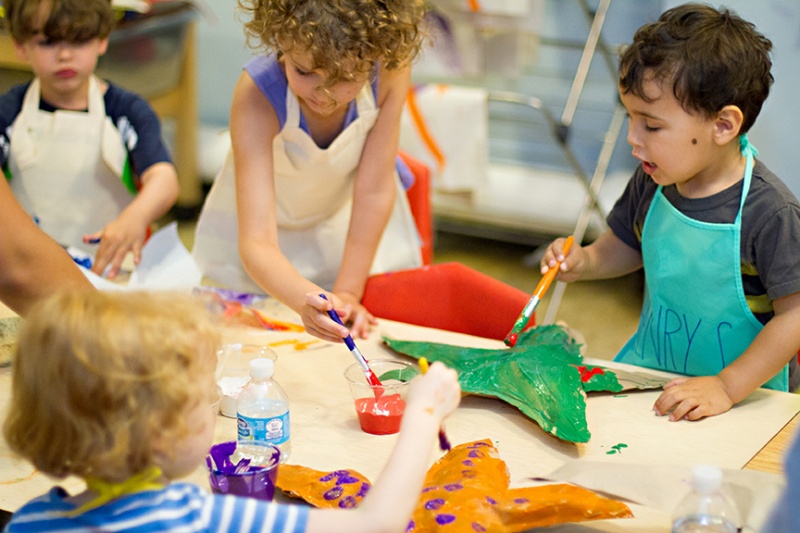 Creative Art
Creative Art
Art experiences are an essential part of our curriculum. The art process stimulates children’s creativity, imagination, and self-expression with a selection of various art lessons, supplies, and materials. Materials such as crayons, markers, paint, and everyday house hold items, and the children to express themselves creatively and to make original products use items found in nature. Children are encouraged to use opened materials creatively performing activities that are safe and that fulfill their desire to express themselves. They develop fine motor skills, problems solve, and learn about cause and effect when they paint, draw, mold clay, create collages, mobiles and weave. Lesson plans are designed to foster children’s familiarity and identification of the Elements of Art: Lines, Shape, Color, Space and Form, Texture, and Rhythm in everyday objects. Teacher guided art activities (with an emphasis on the process) have real application to other areas of the curriculum including, science, social studies and reading readiness. The most important goal of our art program is the growth of each child’s creativity, ability to work independently, and to allow the children to enjoy the process while growing at their own individual pace. For more details and example see pages 57-63 of the Foundation Block.
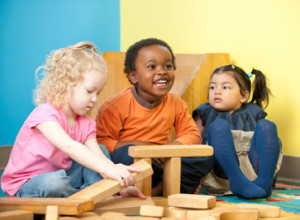 Building Block Math
Building Block Math
We promote the block building experience to reinforce mathematical skills. Our block center is a place for exploration and a perfect place for introducing math concept. Through these playful math experiences, our children learn math skills, such as numbers, patterns, measurement, proportion, shape and size. When paired with other toys (manipulative), we guide and expand children’s discovery in the block by talking about the community and neighborhood. Our supply of play models of family and people from various races, ethnic groups, industries, and professions allows children to recreate the world around them through self initiated construction projects. Children are continually constructing mathematical ideas based on their experiences with the environment, their interactions with adults and other children, and their daily observations. We use block and dramatic play as stepping-stone to develop children’s abstract thinking.
Math
Math is all around us. Our children learn counting, pattering, and geometry by playing with puzzles and games. They also learn to follow directions for games and practice fine motor skills. For more details and examples see pages 10-16 of the Foundation Block. The clean up process after block play in itself is used as a mathematical exercise with the children.
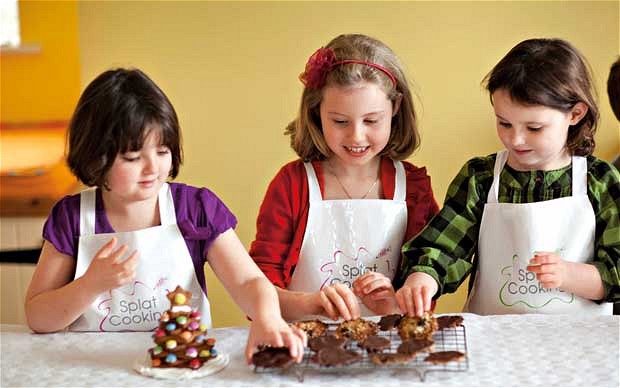 Cooking
Cooking
Cooking provides children with many naturally fun experiences for their five senses. They get to explore with their five senses: seeing, tasting smelling, touching and hearing. Our children also learn math (measuring), science, (watching bread dough rise), and literacy skills (using recipe cards). We support the development of fine motor skills through cutting, kneading, rolling, and mixing. Children are invited to express their creativity through cooking projects. Foundation Block reference page 21.
Dramatic Play
Another way for children to express themselves is through creative dramatic play. Dramatic play occurs daily. It is one of the ways that children develop an imagination and naturally learn. In this learning area children recreate familiar roles and confront scary situations. They negotiate roles and learn how to regulate their own behavior. Pretending and imagining is another stepping stone that supports the development of abstract thinking. Our children stay busy in the dramatic play area. By design this area is fully equipped with child-sized furnishings and toy appliances, costumes, puppets, and a play kit collection. Foundational Block examples as shown on pages 9, 27, 33, and 39 to name a few.
Circle Time
Circle time supports children’s literacy learning with a variety of entertaining reading materials. Develop their reading comprehension, narrative skill, critical thinking, phonemic awareness, and problem solving ability. Circle time offers character-building skills opportunities. It also supports the strengthening of social and communication skills. We make available opportunities for children to interact and to build leadership skills, to learn to work corporative as a member of a team, to negotiate, to develop effective communication skills, to practice skills such as listening, compromising, and to problem solve. Engagement in activities such as Circle Leader, group games and assigned responsibilities, children learn to plan, organize, and develop healthy peer relationships.
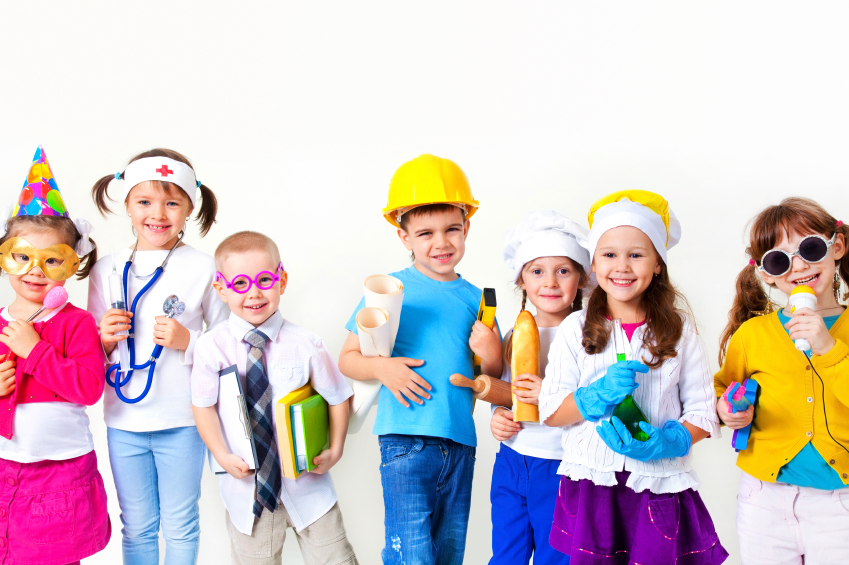
Literacy
Early Literacy is what children know about reading and writing before they can actually read and write. Literacy is broken up into six distinct knowledge areas: letters of the alphabet (know the names of letters and that their sounds are different), phonetic awareness (sound associated with each letter), print awareness (letters make words and words make sentences), vocabulary (learning new words), print motivation (an interest and love of books), and narrative skills (ability to retell the story). Depending on where children are on the developmental spectrum in this area, their acquired awareness of literacy knowledge ultimately leads to a love for stories, books, and drawing. The transformation watching children develop into authors and artists dictating using art supplies to express their ideas is amazing, exciting, and rewarding! For the past 25 years we have offered early literacy experiences with weekly participation in early literacy library story time programs.
Language
Language is something we use every day. We support language development skills by engaging children in conversation and most effectively by integrating the following practices throughout the day: reading books, rhyming words, singing songs and modeling conversations with the children. Language encompasses many different areas to include speaking (using our words), listening, and using our body (nonverbal). Young children rely on nonverbal communication (pointing or crying for something). As children grow they learn to use words (verbal communication) to communicate their needs. As a result of our print rich learning environment, participation in weekly story time at the public library, and in home speech services, our children are very conversational. They enter school with strong language skills as expressive and proficient communicators. See pages 9-16 of the Foundation Block.
Music & Movement
Our music center is fully stocked with musical instruments to include: jingle sticks, pairs tap-tap blocks, pairs of sand blocks, shakers, frame/bongo drums, rhythm sticks, cymbals, wrist bells, triangles, crow sounders, maracas and much more. Playing musical instruments, singing, and dancing are creative outlets. Children express themselves and find comfort through music, dance, and movement. The children learn patterning and crate a foundation for math when they chant and keep time with music. Exploring music and rhythm helps to develop balance, spatial awareness, and whole body/brain integration. In addition, dancing-physical movement is powerfully connected to cognitive growth and reading readiness.
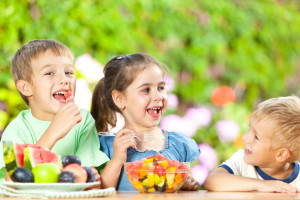 Nutrition
Nutrition
We promote healthy eating habits by providing nutritious snacks and meals that align with MyPlate http://www.choosemyplate.gov/ We introduce and reinforce lessons on good nutrition. Here is a list highlights the areas of children nutrition that we consider to be important.
- Limiting foods high in sugar, salt, and fat.
- Making available fruits, vegetables, and protein-rich foods
- Offering a balanced diet
- Serving healthy nutritious meals and snacks food
In the area of Meal Planning- We choose to participate in a cycle menu provided through the Fairfax County Office for Children Child and Adult Food Program (CACFP). We are committed to offering meals in accordance to the cycle menu daily meals and snack menus. This practice assures compliance and adherence to the USDA MY Plate dietary guidelines. This practice serves as our daily reminder to remain focus on the importance of children nutrition. At meal times we enjoy a family-style meal together. Children learn to set the table, clean up after themselves, and wash hands before and after eating. Empowering children to learn about and to do these things on their own helps them to become independent and teaches them problem-solving and decision-making skills, it also builds children’s confidence and competence! We use the meal time experience to help children identify healthy and unhealthy foods, and to engage in simple practices and habits that promote health and prevent illness. For more detailed information on this practice read page 43 of the Virginia Health and Physical Development Foundation Block 6
Sand and Water
Children are invited to express feelings and calm themselves through sand and water play. This allows them to experiment with math skill such as pattering, volume, and shape while making sand constructions or pouring water.
Science
Scientific activities include observation of nature, insects, worms, plants, flowers, weather, and other natural phenomena. Engagement in these activities allows the children to predict, experiment, and graph results. Through field trips, children quickly learn that science is all around us. Scientific knowledge defines what children know about their world and how to go about learning more about the world. Our engaging field trips are participative, exploration, and challenging with opportunities to learn new concept while reinforcing and building on known concepts. As a result, we see children engage in a high level of logic, problem solving, and reasoning interactions. We offer the children many opportunities and guide participation in problem solving and reasoning exercises.
Social and Emotional
We help children through their learning process on how to function effectively in a group, how to express their feelings, acquire social skills, make friends, and promote mutual respect amongst and with each other. Our role is to support social and emotional developments and to provide positive guidance. We build a warm, positive, supportive, and responsive relationship with each child. We help each child to learn about and take pride in his or her individual and cultural identity. Ours is a supportive environment in which we use effective strategies to promote children’s self-regulation, support acceptable behaviors and effectively intervention for children with persistent challenging behavior. Taking into consideration all of the above, we meet children where they are developmentally. We evaluate each child’s approach to learning through observation, documentation, and parent collaboration to gather date to plan a curriculum to meet each child’s need. We have been using The AL’s Pal Program to advance our children’s social and emotional development since its inception with much success. Al’s Pal Program is a nationally recognized evidence-based curriculum and teacher training program develops social-emotional and life skills in children 3-8 years old. Visit http://wingspanworks.com/ to learn more about this powerful program!
Social Studies Knowledge
We help to educate children on self, other, and environmental awareness. Knowing how to be part of a social group is not natural or innate. Learning about oneself and others and how to act with others is a long learning process. Children learn different ways in which people are alike and different though ethnic/cultural celebrations. Social studies are an important part of a children’s learning: We help the children understand the complexities of their world. We form trusting relationships with each child in a safe and loving environment. Ours is a nurturing environment in which children learn, play and grow together. We are a happy bunch! We help children discover and appreciate their own uniqueness by beginning with the positive acceptance of others. Our teaching extends into the cultivation of peace, trust, respect, kindness, and consideration towards others. We maintain a peaceful atmosphere through the practice of “We do not intentionally hurt others” and “We use word”. The community is rich with resources that can enrich children’s learning experiences. Through community field trips children connect with the community. Community field trips help children to gain knowledge and to clarify information already acquired to enhance children’s learning experiences.

